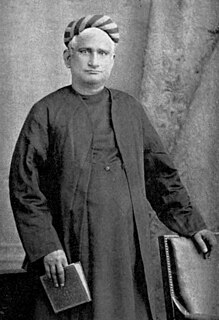
Bankim Chandra Chatterjee CIE was an Indian novelist, poet and journalist. He was the author of the 1882 Bengali language novel Anandamath, which is one of the landmarks of modern Bengali and Indian literature. He was the composer of Vande Mataram, originally in Sanskrit, personifying India as a mother goddess and inspiring activists during the Indian Independence Movement. Chattopadhayay wrote fourteen novels and many serious, serio-comic, satirical, scientific and critical treatises in Bengali. He is known as Sahitya Samrat in Bengali.

Anand Math is a 1952 Indian Hindi-language historical drama film directed by Hemen Gupta, based on the famous Bengali novel Anandamath, written by Bankim Chandra Chatterjee in 1882. The novel and film are set in the events of the Sannyasi Rebellion, which took place in the late 18th century in Bengal. In a BBC World Service poll conducted in 2003 across 165 countries, the Vande Mataram song written by Bankim Chandra Chatterjee, composed by Hemant Kumar, sung by Lata Mangeshkar was voted 2nd in the "World's Top Ten" songs of all-time.

Devadasu is a 1953 Indian romance film, directed by Vedantam Raghavaiah and produced by D. L. Narayana for Vinodha Pictures. Aluri Chakrapani wrote the script based on Sarat Chandra Chattopadhyay's novel, Devdas. C. R. Subbaraman composed the film's music. The film was edited by P. V. Narayanan, while B. S. Ranga provided the cinematography.
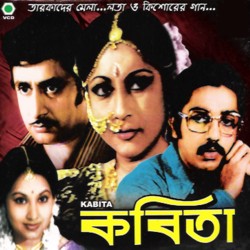
Kabita is a 1977 Indian Bengali-language film directed by Bharat Shumsher, starring Mala Sinha in the lead role. The film is a remake of the Tamil classic film Aval Oru Thodar Kathai (1974) where Kamal Haasan had a supporting role as a neighbor. He played the same role in the Bengali remake, thus his only foray into Bengali film industry. He also acted in the Telugu remake Anthuleni Katha (1976) with Jayaprada, playing a different role as her boss and suitor. He also did a guest role in another remake, the Kannada film Benkiyalli Aralida Hoovu (1983) with his real-life niece Suhasini playing the lead role. The only remake he didn't appear in is the Hindi film Jeevan Dhaara (1982) starring Rekha.
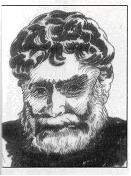
Satish Chandra Mukherjee was a pioneer in establishing a system of national education in India, along with Sri Aurobindo.
Nabendu Ghosh was an Indian author in Bengali literature, and screenwriter. He has written screenplays of classic Bollywood movies like, Sujata, Bandini, Devdas, Majhli Didi, Abhimaan and Teesri Kasam. He has written stories for movies like Baap Beti, Shatranj, Raja Jani. He has also acted briefly in Do Bigha Zameen, Teesri Kasam and Lukochuri. Later in his career, he directed four movies as well.

Aval Oru Thodar Kathai is a 1974 Indian Tamil-language drama film directed by K. Balachander. The story revolves around a working middle-class woman, who sacrifices her desires to support her large family. The lead role was played by Sujatha in her first Tamil film, which was also her first starring role. Kamal Haasan, Vijayakumar, Jai Ganesh, M. G. Soman and Sripriya played key roles. The film was shot in black-and white.

Raja Sen is an Indian film & television director and the winner of three National Film Awards from Kolkata, West Bengal, India. He is the father of actress Rimi Sen.
Durgeshnandini is a Bengali historical romance novel written by Indian writer Bankim Chandra Chattopadhyay in 1865. Durgeshnandini is a story of the love triangle between Jagat Singh, a Mughal General, Tilottama, the daughter of a Bengali feudal lord and Ayesha, the daughter of a rebel Pathan leader against whom Jagat Singh was fighting. The story is set in the backdrop of Pathan-Mughal conflicts that took place in south-western region of modern-day Indian state of Paschimbanga during the reign of Akbar.
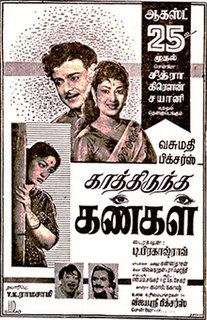
Kathiruntha Kangal is a 1962 Indian Tamil-language film directed by T. Prakash Rao. The film stars Savitri and Gemini Ganesan, the former in dual roles. It is a remake of the 1960 Bengali film Smrithi Tukku Thak, which itself was adapted from the Bengali play of the same name by Malabika Roy. The film revolves around twin sisters who get separated at birth due to circumstances, and cross paths as adults. It was released on 25 August 1962, and emerged a commercial success.

Harischandra is a 1944 Indian Tamil-language film directed by K. Nagabhushanam and written by T. C. Vadivel Nayakar, starring P. U. Chinnappa and P. Kannamba. It is based on the legend of king Harishchandra.
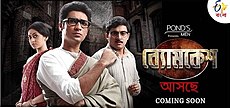
Byomkesh was a 2014 Indian Bengali crime fiction television series based on the Bengali sleuth Byomkesh Bakshi created by Sharadindu Bandyopadhyay. The series starred Gaurav Chakrabarty, Saugata Bandyopadhyay and Ridhima Ghosh as Byomkesh Bakshi, Ajit and Satyabati respectively. The series premiered on 20 November 2014 on Colors Bangla channel and ended on 14 November 2015. The first episode was narrated by Sabyasachi Chakrabarty.
Kamal Ghosh was an Indian cinematographer and film director. Although a native of Kolkata, he was active primarily in Tamil and Telugu cinema.

Ananthasayanam is a 1942 Tamil language film produced by and starring Krishnaswami Subrahmanyam in the lead role. Subrahmanyam co-directed the film with C. S. V. Iyer. The film also featured S. D. Subbulakshmi and M. V. Rajamma as the female leads with G. Pattu Iyer and V. N. Janaki playing supporting roles.

Paropakaram is a 1953 Indian Tamil-language film directed by Kamal Ghosh. The film stars Ramesh Sharma and Savithri.
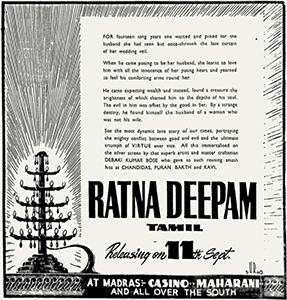
Ratna Deepam is a 1953 Indian Tamil-language film directed by Debaki Bose. The film stars Abhi Bhattacharya and Anupama.
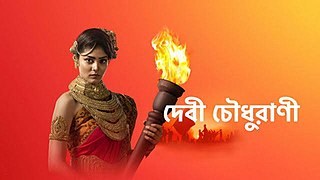
Debi Chaudhurani was an Indian Bengali-language period drama that premiered on 16 July 2018 and aired on Star Jalsha daily. It was produced by Subrata Roy, Joydeb Mondal and stars Sonamoni and Rahul Majumdar in lead roles. Sujan Mukherjee, Tanima Sen, Rayati Bhattacharya among others play supporting roles. Since its launch, Debi Chaudhurani became one of the most-watched shows on its airing channel, Star Jalsha.

Karunamoyee Rani Rashmoni is an Indian Bengali historical drama television series which aired on Bengali Entertainment Channel Zee Bangla and is also available on the digital platform ZEE5, even before TV telecast. It was premiered on 24 July 2017. The serial was earlier produced by Subrata Roy and then it was produced by Zee Bangla. It completed 1,000 episodes on its third birthday and 1,500 episodes on 26 December 2021. After a successful run of 4+1⁄2 years, Karunamoyee Rani Rashmoni went off-air on 13 February 2022.














